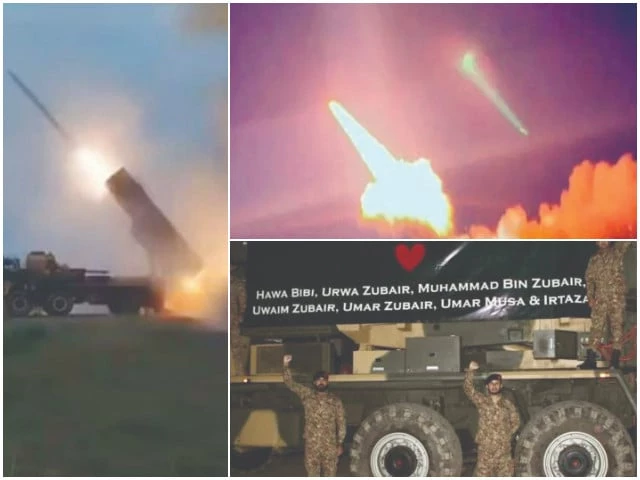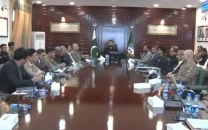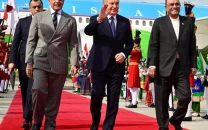Ceasefire after fire and fury
US brokers Pakistan-India truce after military unleashes firepower on enemy under Operation 'Bunyan-al-Marsoos'

Pakistan and India on Saturday agreed to a ceasefire brokered by the United States in a dramatic turn of events preventing a wider conflict between the two nuclear armed neighbours.
However, within hours of the agreement, the Indian foreign secretary accused Pakistan for violating the ceasefire. The Foreign Office late night issued a statement and rejected Indian allegations, saying Pakistan was committed to the ceasefire agreement.
A statement issued by the FO spokesperson in response to media queries on the issue said: "Pakistan remains committed to faithful implementation of ceasefire between Pakistan and India, announced earlier today.
"Notwithstanding the violations being committed by India in some areas, our forces are handling the situation with responsibility and restraint."
The spokesperson said that any issues in the smooth implementation of the ceasefire should be addressed through communication at appropriate levels.
"The troops on ground should also exercise restraint," he added.
Earlier when Pakistan on the early hours of Saturday launched a barrage of missile strikes through air and surface, targeting 26 military installations across India, the panic was not only set in New Delhi but in many world capitals.
Pakistan had promised retaliation after India conducted a series of missile strikes hitting deep inside the cities. Their strikes killed 26 innocent civilians.
The tipping point, however, was India's missile strikes on airbases, including Nur Khan Air Base in Rawalpindi. The Nur Khan base is not only a key logistic base but is used for VVIP movements.
Soon after the Indian missile strikes, Pakistan launched a massive attack that stunned India. At that point, world capitals, including the Indian closest allies, realised that the situation reached a point where anything could happen.
As people woke up to more missile and drone exchanges between the two countries, diplomacy was already at work.
US Secretary of State Marco Rubio spoke to Prime Minister Shehbaz Sharif, Army chief General Syed Asim Munir and Indian External Affairs Minister.
In the afternoon, when people in many cities in Pakistan came out to celebrate the country's victory, President Trump broke the story about the ceasefire.
"After a long night of talks mediated by the United States, I am pleased to announce that India and Pakistan have agreed to a FULL AND IMMEDIATE CEASEFIRE. Congratulations to both Countries on using Common Sense and Great Intelligence," he said in a post on Truth Social.
Minutes after the US president's announcement, Deputy Prime Minister and Foreign Minister Ishaq Dar confirmed the development on social media, while also reaffirming Pakistan's consistent pursuit of peace and regional stability while emphasising that the country remains firm in defending its sovereignty and territorial integrity.
In a statement posted on social media, Jaishankar said, "India and Pakistan have today worked out an understanding on stoppage of firing and military action."
He reiterated India's longstanding position on terrorism, stating that the country maintains a "firm and uncompromising stance against terrorism in all its forms and manifestations" and will continue to do so.
Meanwhile, Indian Foreign Secretary Vikram Misri later also confirmed an immediate ceasefire agreement had been reached Pakistan, suspending all military operations on land, in the air, and at sea
Addressing a press briefing in New Delhi, Misri said the decision was the result of sustained diplomatic engagement and reflects a mutual desire to prevent further escalation.
"The government of India confirms that all military activity with Pakistan has been suspended with immediate effect across all domains," he stated.
US Secretary of State Marco Rubio stated on social media that India and Pakistan had agreed to an immediate ceasefire and are to begin formal talks on a range of issues at a neutral venue, following intensive US diplomatic efforts.
In a statement posted on social media, Rubio said that over the past 48 hours, he and US Vice President JD Vance had engaged with senior Pakistani and Indian leaders, including Prime Ministers Shehbaz Sharif and Narendra Modi and, Chief of Army Staff General Asim Munir, Indian External Affairs Minister Subrahmanyam Jaishankar, and National Security Advisors Ajit Doval and Asim Malik.
Tensions between India and Pakistan escalated sharply following the April 22 attack in Pahalgam, Indian Illegally Occupied Jammu and Kashmir (IIOJK), which left 26 dead. India blamed Pakistan-based elements without providing evidence; Islamabad rejected the allegations.
In response, India closed the Wagah border, revoked Pakistani visas, and suspended the Indus Waters Treaty. Pakistan called the move an "act of war" and sealed its side of the crossing.
On May 67, explosions were reported in Pakistani cities including Muzaffarabad and Bahawalpur. Pakistan accused India of airstrikes and launched Operation Bunyan-un-Marsoos in retaliation, targeting Indian military installations.
Pakistan claimed to have downed five Indian fighter jets, including three Rafales. Lt Gen Ahmed Sharif Chaudhry said more could have been shot down but Pakistan chose restraint. A French intelligence official confirmed to CNN the first-ever combat loss of a Rafale jet.
Pakistan also reported intercepting 77 Israeli-made Harop drones using both electronic and conventional defences. The military stated that the operation is targeting launch points used in attacks on civilians and mosques. As part of the campaign, Pakistan launched the Al-Fatah missile in honour of children killed in recent strikes.
Defence Minister Khawaja Asif confirmed that no meeting of the National Command Authority had been held or was planned.
A detailed statement issued by the foreign office while confirming the ceasefire said it was important to put the relevant developments in the right perspective.
It said in response to the firing of Brahmos missiles over several locations across the international border, Pakistan was constrained to retaliate to the unprovoked and unlawful Indian aggression in exercise of its right to self-defence under Article 51 of the UN Charter. Accordingly, Pakistan launched "Operation Bunyan-ul-Marsoos" early Saturday.
The statement said without a shred of evidence, and disregarding Pakistan's offer for a neutral, transparent and credible investigation by international investigators, India launched multiple strikes during the nights of 7-10 May 2025 which caused loss of innocent lives including women, children and the elderly. These indiscriminate attacks seriously injured dozens, in addition to causing damage to infrastructure, including places of worship.
As if the dastardly aggression during the intervening night of 6 and 7 May, breach of Pakistan's sovereign airspace through firing of missiles and killer drones, and consequent human and material losses were already not grave enough, India further endangered the regional peace and stability by sending additional waves of killer drones in large numbers across the length and breadth of Pakistan, including the Federal Capital.
These killer drones/loitering munitions and missiles struck multiple civilian and military assets, inflicting further human and material losses and caused a great sense of insecurity among the Pakistani people, leading to heightened public demand for an immediate response in self-defence. Multiple missiles were also fired, targeting our air bases.
Despite facing blatant Indian aggression and persistent provocations, Pakistan exercised great restraint. However, it was constrained to respond to ensure the safety and security of its people.
Notwithstanding the incessant provocations, our response deliberately avoided civilian casualties and was precise, proportionate, minutely calibrated, and manifestly restrained. Only those entities and facilities were targeted which planned, coordinated, and executed blatant aggression against Pakistan and the cold-blooded killing of its innocent civilians. These targets also included those Indian airbases from where Pakistani airbases were subjected to unprovoked missile attacks. Irrefutable evidence in this regard has already been shared with the international community.
This dangerous conflagration between two nuclear-armed states calls for deeper introspection and a holistic appraisal by the international community. Far from being a matter of deep-rooted historic differences between the two neighbouring states in the volatile region of South Asia, the conflict ought to be seen in the broader context of the competing geopolitical interests.
The negative impact of this competition has been a constant variable of the regional security paradigm. Hence, any casus belli of the conflict, contrived or actual, cannot be lumped onto any country without due understanding of the genesis and root causes of the problems leading to frequent regional conflicts which the region and the world can ill afford.
Strategic instability in South Asia is a result of the unresolved Jammu and Kashmir dispute. This dispute has been aggravated by Indian suppression of the legitimate struggle of Kashmiris for the inalienable right to self-determination and falsely equating it with terrorism.
The scourge of terrorism and extremism is not intrinsic to South Asia. However, the undesirable and abhorrent debris of Cold War dynamics transformed the socio-political landscape and shattered regional peace. How the journey of Pakistan and the South Asian region from a progressive, tolerant, and forward-looking society to the current state was induced remains a subject to be explored by all the partners of the Grand Enterprise who cannot now remain silent spectators.
Despite herculean challenges, Pakistan re-emerged from the ravages of the Cold War as a resilient state and society that became the bulwark against the spread of terrorism and extremist ideology, albeit at a monumental cost. Pakistan's sacrifices and contributions to the global fight against terrorism, especially post-9/11, are unparalleled. India, probably sensing an opportunity in Pakistan's overwhelming commitment to the fight against terrorism along the Western borders, has repeatedly attempted to exploit this perceived vulnerability by waging an intense hybrid campaign against Pakistan and orchestrating terrorism through proxies to destabilise it. India's military provocations post-9/11 ought to be seen in the same light.
Through such insidious manoeuvres, despite being a victim of terrorism, Pakistan is continuously being subjected to a two-front situation so that it remains mired in internal problems and not able to focus on its development as well as the re-transformation of its society.
Surprisingly, India's bogey of Pakistan as the 'epicentre' of terrorism quickly resurfaces whenever Pakistan is close to decisively eliminating the menace of terrorism. This vicious cycle, going on for over two decades, must end now. Any distraction for Pakistan, at this critical juncture, from its monumental struggle against the scourge of terrorism and the creeping extremist ideology from its west would be to the great peril of regional peace and global stability.
Pakistan urges the international community to restrain India from using the sham narrative of the so-calledterrorism from Pakistan in order to secure sustainable peace. A forward-looking Pakistan needs support, not indifference from the international community.
India must also realize that its attempts to externalise an internal issue, i.e. organic resistance to state-sanctioned persecution of minorities, and internalise an external issue, i.e. Jammu and Kashmir Dispute, are dangerous and destabilising. India must not use the phenomenon of terrorism as a vehicle to secure policy goals such as the abrogation of Indian Illegally Occupied Jammu and Kashmir's statehood and illegally holding the Indus Water Treaty in abeyance. Pakistan cannot be coerced by such antics.
Pakistan is willing to engage in constructive diplomacy and comprehensive dialogue with India and seek resolution of all issues, including the Jammu and Kashmir Dispute, through peaceful means. The international community must also play its role in preventing further escalation.
All elements of national power remain committed to ensuring the sovereignty and territorial integrity of Pakistan. Our Armed Forces are obligated to take all measures for defending the motherland, its citizens, and in contributing to securing Pakistan's vital national interests. This obligation is a sacred trust of the proud, resilient, brave, and honourable people of Pakistan.
For the sake of regional peace and stability, Pakistan mounted a very responsible, proportionate, and mature response. It is aware of the disastrous consequences of further escalation between two nuclear states; it is absolutely inconceivable. Any propensity to tread this dangerous path is fraught with catastrophic consequences for the complete region and beyond; hence, such an approach ought to be avoided.





















COMMENTS (2)
Comments are moderated and generally will be posted if they are on-topic and not abusive.
For more information, please see our Comments FAQ